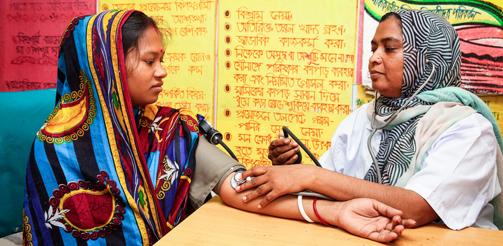Sometimes in my work I feel really well informed and sometimes I feel totally naïve. Maybe this is a familiar feeling to all, but this week I felt it acutely. Let me explain why…

At the 62nd Commission for the Status of Women (CSW62) IDS participated in a high profile New York summit meeting to discuss the challenges and opportunities in achieving gender equality and the empowerment of rural women and girls.
A panel of researchers and NGOs, argued that adequate policies, programmes, and investments in women’s health and education not only lift women’s living standards but also pave a way towards gender equality.
At this event IDS, as part of The Impact Initiative programme, launched an accompanying policy brief with the aim of contributing to the knowledge and evidence needed to address gender disparities and improve the life choices of women and girls.
The briefing draws on a collection of ESRC-DFID-funded research identifying critical elements that are important to address if women’s and girls’ lives are to change for the better.
I am proud to have been part of the project team behind the paper and the panel discussion. It reminds us that we need to change the structures and policies that continue to hold women back.
Boom – big statements. Evidence in action. Great work.
Later this same week I emailed a partner organisation in India asking if they would like to co-lead a proposal for USAID funding to further an idea we have around women’s access to digital services. My esteemed contact, who works to deliver online platforms committed to reaching young people and subverting sexual and gender stereotypes, replied, “we can’t as we will have to sign an ‘anti-choice’ / anti-abortion policy (Trump’s Gag Rule)”
“What are you talking about?” I said. I didn’t want to appear stupid so I quickly googled, Trump’s Gag Rule.
The global gag rule withholds USAid funding from any overseas family planning organisation that offers or provides information about abortions. In reality this also extends into other sexual health and contraception services.
I remembered Donald Trump’s reinstated rule and, like many, had felt shock at the time. But until now I hadn’t really considered this in action in the context of research and development.
This is when I felt truly naïve. Here I am – a white, educated, middle-class woman in a UK research organisation. I had been writing about women’s life choices as though it was an academic subject. Sharing excellent, neatly packaged evidence to willing hearts and minds. Meanwhile, the Trump administration has not only not recognised the importance of women’s life choices but it has actively been preventing them.
Heavy sigh – one step forward and two huge leaps back.
Logically, I know that change isn’t easy. We move mountains sometimes by shifting small stones.
To increase awareness and understanding of global development research and improve the use of knowledge in effective decision-making, we often have to employ lots of tools and communications techniques. In the Knowledge, Impact and Policy team at IDS we do this in a range of ways that includes developing innovative research communications products and bringing people together to share knowledge and build networks.
In an attempt to combat the resources ban, several countries have already come together to help plug the funding gap. My colleague in India also shared details of the SheDecides movement with me that really helped further my understanding of the issue and it also gave me hope. It reinforced my belief that working to share credible and available evidence with the “right” people is not enough. We need to listen and learn from each other to better understand the contexts in which we are working and join forces if we are to help change dire, real life, situations.
Join the conversation on twitter and put forward your suggestions for policies that can improve women’s life choices. #Policies4 Improving Life Choices for Women.
Kelly Shephard is Head of the Knowledge, Impact and Policy team at IDS.
Image: Bangladesh Aylapata Kata, Borguna. ‘Tripti Rani (20), who is seven months pregnant, has her blood pressure checked at the union health and family planning centre where the treatment is free.’ Credit: G.M.B. Akash / Panos